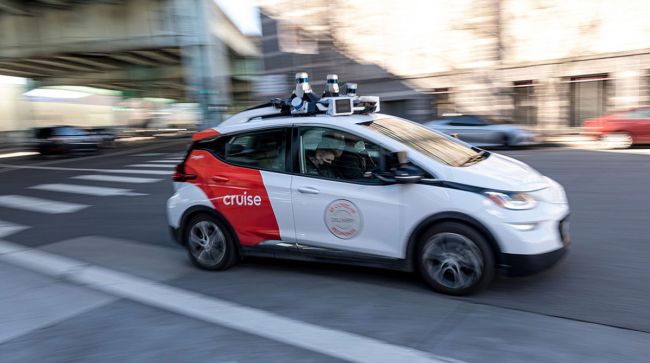Cruise, the taxi company that uses self-driving cars, is preparing to come to Raleigh and may be interested in Durham, N.C., as well.
On Aug. 22, the company began “initial testing/data collection” in Raleigh using cars with drivers behind the wheel, according to spokeswoman Anna Haase. The company is looking to expand its robotaxi service beyond San Francisco, Phoenix and Austin, where it began offering rides to passengers last year.
“This is an important first step in getting to know Raleigh’s unique roadways and driving behaviors as we continue to work toward bringing our driverless tech to more people in more places,” Haase wrote in an email.
Cruise, which is backed by General Motors, began similar testing in Charlotte, Miami, Nashville and Atlanta earlier this summer. In May, the company announced that it would expand to other places in Texas, starting with Houston and Dallas.

A Cruise robotaxi had a green light and was passing through an intersection when it was hit by a San Francisco fire truck. (abc7news.com)
Haase said she couldn’t say when the service might be available in Raleigh.
Durham Mayor Elaine O’Neal said she recently received a call from someone at Cruise to let her know that the company was interested in introducing its driverless vehicles there as well.
“I never thought I’d see cars going down the streets of Durham, North Carolina, without a driver,” O’Neal said at a GoTriangle board meeting Aug. 23. “But evidently that’s what’s going to happen fairly soon.”
The Cruise compact cars are fairly easy to spot. They’re white, with the company name and red stripes on the sides, and are topped with cameras and other equipment that helps guide them. Just below the back window is a warning: “May stop quickly.”
Cruise and its main competitor, Waymo, began operating 24 hours a day across all of San Francisco this summer, offering rides during busy daytime traffic for the first time. The expansion was followed by a series of high-profile accidents for Cruise, including a car that became stuck in wet concrete in a construction zone and another that hit a fire truck answering a call.
In another incident, several Cruise cars stalled in a busy neighborhood near a music festival in a park. The company said so many people were using cellphones at the festival that the wireless connections to the cars failed.
The California Division of Motor Vehicles late last week asked Cruise to take half its San Francisco fleet off the road while it investigates the incidents.
Cruise agreed, but also said it believes its cars improve overall road safety. More than 40,000 people are killed each year in car crashes in the United States, the company notes, almost all of them due to human error.
The company says its cars have driven more than 4 million driverless miles and now routinely complete more than 1,000 driverless trips with passengers each day.






